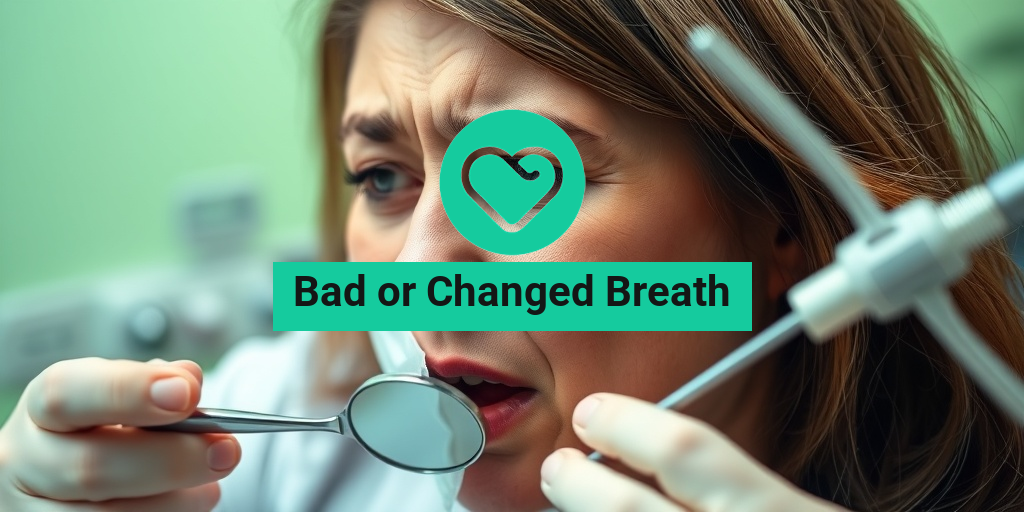What Is Bad Breath?
Bad breath, medically known as halitosis, is a common condition that affects many individuals at some point in their lives. It is characterized by an unpleasant odor emanating from the mouth, which can be embarrassing and socially isolating. While occasional bad breath is normal, persistent halitosis can indicate underlying health issues that may require attention.
Understanding bad breath involves recognizing that it can stem from various sources, including oral hygiene practices, dietary choices, and even medical conditions. The odor is often caused by the breakdown of food particles in the mouth, the presence of bacteria, or the release of volatile sulfur compounds. If you find yourself frequently concerned about your breath, it’s essential to explore the potential causes and solutions.
Common Causes of Bad Breath
Identifying the root cause of bad breath is crucial for effective treatment. Here are some of the most common culprits:
Poor Oral Hygiene
One of the leading causes of bad breath is inadequate oral hygiene. When you neglect to brush and floss regularly, food particles can remain trapped between your teeth and on your tongue, leading to bacterial growth. This bacteria produces sulfur compounds that contribute to unpleasant odors. To combat this, ensure you brush your teeth at least twice a day and floss daily. Don’t forget to clean your tongue, as it can harbor bacteria as well!
Dietary Choices
Your diet plays a significant role in the freshness of your breath. Foods such as garlic, onions, and certain spices can leave lingering odors that are difficult to eliminate. Additionally, high-protein diets can lead to bad breath due to the breakdown of proteins in the mouth. Staying hydrated and consuming crunchy fruits and vegetables can help mitigate these effects by promoting saliva production, which naturally cleanses the mouth.
Dry Mouth
Dry mouth, or xerostomia, occurs when your salivary glands do not produce enough saliva. Saliva is essential for washing away food particles and bacteria, so a lack of it can lead to bad breath. Conditions such as dehydration, certain medications, or breathing through your mouth can contribute to dry mouth. If you experience this, consider drinking more water throughout the day and discussing potential solutions with your healthcare provider.
Medical Conditions
In some cases, persistent bad breath can be a sign of an underlying medical condition. Conditions such as sinus infections, respiratory infections, diabetes, and gastrointestinal issues can all contribute to halitosis. If you notice that your bad breath persists despite good oral hygiene practices, it may be time to consult a healthcare professional for further evaluation.
Tobacco Products
Using tobacco products not only contributes to bad breath but also damages your gums and increases your risk of gum disease. Quitting smoking or using tobacco can significantly improve your breath and overall oral health. If you need support in quitting, consider reaching out to resources like Yesil Health AI for evidence-based strategies and guidance.
Dental Issues
Tooth decay, gum disease, and other dental problems can also lead to bad breath. Bacteria thrive in decayed teeth and infected gums, producing foul odors. Regular dental check-ups are essential for maintaining oral health and preventing these issues. If you suspect dental problems, don’t hesitate to visit your dentist for a thorough examination.
Conclusion
Bad breath can be a frustrating and embarrassing issue, but understanding its causes is the first step toward finding a solution. By practicing good oral hygiene, making mindful dietary choices, and addressing any underlying health concerns, you can significantly improve your breath. If you’re looking for more information on maintaining oral health or dealing with bad breath, consider visiting Yesil Health AI for reliable health answers. Remember, fresh breath is not just about confidence; it’s also a reflection of your overall health! 🌟

Symptoms of Changed Breath
Changed breath, often referred to as halitosis or bad breath, can be a source of embarrassment and discomfort. Understanding the symptoms associated with this condition is crucial for identifying its underlying causes and seeking appropriate treatment. Here are some common symptoms to watch for:
1. Persistent Bad Odor
The most noticeable symptom of changed breath is a persistent foul odor emanating from the mouth. This odor can vary in intensity and may be more pronounced after eating certain foods, such as garlic or onions. If you notice that your breath consistently has an unpleasant smell, it may be time to investigate further.
2. Dry Mouth
Dry mouth, or xerostomia, can contribute significantly to bad breath. Saliva plays a vital role in washing away food particles and bacteria in the mouth. When saliva production decreases, it can lead to an increase in bacteria, resulting in a foul smell. If you often wake up with a dry mouth or feel parched throughout the day, this could be a symptom of changed breath.
3. Coated Tongue
A coated tongue can be another indicator of bad breath. A white or yellowish coating on the tongue can harbor bacteria and food particles, leading to an unpleasant odor. Regularly inspecting your tongue can help you identify this symptom early on.
4. Taste Changes
5. Gum Issues
Gum disease, characterized by swollen, bleeding gums, can also be a symptom of bad breath. If you notice any signs of gum problems, such as tenderness or persistent bad breath, it’s essential to consult a dental professional. Addressing gum health can significantly improve breath quality.
Risk Factors for Bad Breath
Understanding the risk factors associated with bad breath can help you take proactive steps to prevent it. Here are some common factors that may contribute to the development of halitosis:
1. Poor Oral Hygiene
One of the leading causes of bad breath is inadequate oral hygiene. Failing to brush and floss regularly allows food particles to remain in the mouth, promoting bacterial growth. Make sure to brush your teeth at least twice a day and floss daily to maintain fresh breath. 🪥
2. Diet Choices
Your diet can significantly impact your breath. Foods like garlic, onions, and certain spices can leave lingering odors. Additionally, a diet low in carbohydrates can lead to ketosis, which can also cause bad breath. Staying hydrated and maintaining a balanced diet can help mitigate these effects.
3. Smoking and Tobacco Use
Smoking and other forms of tobacco use are notorious for causing bad breath. Not only do they leave a foul smell, but they also contribute to gum disease, which can further exacerbate the problem. Quitting smoking can lead to improved breath and overall oral health. 🚭
4. Medical Conditions
Several medical conditions can contribute to bad breath, including:
- Sinus infections: These can lead to post-nasal drip, which can cause bad breath.
- Diabetes: Uncontrolled diabetes can lead to a fruity odor in the breath.
- Gastroesophageal reflux disease (GERD): This condition can cause stomach acids to flow back into the esophagus, leading to bad breath.
5. Medications
Certain medications can cause dry mouth as a side effect, which can contribute to bad breath. If you’re taking medications that affect saliva production, discuss alternatives with your healthcare provider. 💊
By being aware of the symptoms and risk factors associated with changed breath, you can take steps to improve your oral health and maintain fresh breath. Regular dental check-ups and good oral hygiene practices are essential in preventing and addressing this common issue.

Diagnosis of Bad Breath
Bad breath, medically known as halitosis, can be an embarrassing condition that affects many individuals. Understanding how to diagnose bad breath is crucial for addressing the underlying causes and finding effective solutions. Here, we’ll explore the various methods used to diagnose this common issue.
Self-Assessment Techniques
Before seeking professional help, you can perform a simple self-assessment to gauge the severity of your bad breath:
- Smell Test: Lick the back of your hand, let it dry for a few seconds, and then smell it. This can give you an idea of your breath’s odor.
- Floss Test: Use dental floss between your teeth and smell it afterward. If it has an unpleasant odor, it may indicate bad breath.
- Partner Feedback: Sometimes, the best way to know is to ask a trusted friend or family member for their honest opinion.
Professional Diagnosis
If self-assessment indicates persistent bad breath, it’s time to consult a healthcare professional. Here are some common diagnostic methods:
- Dental Examination: A dentist will check for cavities, gum disease, or other oral health issues that could contribute to bad breath.
- Medical History Review: Your doctor may ask about your medical history, medications, and lifestyle habits that could affect your breath.
- Halimeter Test: This specialized device measures the concentration of volatile sulfur compounds (VSCs) in your breath, which are often responsible for bad odors.
Identifying Underlying Causes
Diagnosing bad breath also involves identifying potential underlying causes, which can include:
- Poor Oral Hygiene: Inadequate brushing and flossing can lead to plaque buildup and bad breath.
- Dry Mouth: Saliva helps cleanse the mouth; a lack of it can lead to halitosis.
- Diet: Certain foods, like garlic and onions, can contribute to temporary bad breath.
- Medical Conditions: Conditions such as sinus infections, diabetes, or gastrointestinal issues can also be culprits.
Home Remedies for Bad Breath
Once you’ve diagnosed the cause of your bad breath, you may want to explore some effective home remedies to combat it. Here are several natural solutions that can help freshen your breath and improve your oral health.
Hydration is Key
Staying hydrated is essential for maintaining fresh breath. Drinking plenty of water helps wash away food particles and bacteria that can cause bad odors. Aim for at least 8 glasses of water a day to keep your mouth moist and your breath fresh. 💧
Herbal Remedies
Several herbs are known for their breath-freshening properties:
- Peppermint: Chewing peppermint leaves or using peppermint oil can provide a refreshing scent.
- Parsley: This common herb contains chlorophyll, which can neutralize odors. Chewing on fresh parsley can be a quick fix!
- Green Tea: Rich in antioxidants, green tea can help reduce bacteria in the mouth and improve breath.
Good Oral Hygiene Practices
Maintaining a consistent oral hygiene routine is crucial for preventing bad breath:
- Brush Twice Daily: Use fluoride toothpaste to brush your teeth at least twice a day.
- Floss Daily: Flossing removes food particles and plaque from between your teeth, where your toothbrush may not reach.
- Clean Your Tongue: The surface of your tongue can harbor bacteria. Use a tongue scraper or your toothbrush to clean it regularly.
Dietary Adjustments
What you eat can significantly impact your breath. Consider these dietary tips:
- Avoid Strong Odors: Limit foods like garlic, onions, and spicy dishes that can linger on your breath.
- Snack on Crunchy Fruits and Vegetables: Apples, carrots, and celery can help clean your teeth and freshen your breath naturally.
- Limit Sugary Foods: Sugar can promote bacterial growth in your mouth, leading to bad breath.
By implementing these home remedies and maintaining good oral hygiene, you can effectively manage and improve your breath. Remember, if bad breath persists, it’s essential to consult a healthcare professional for further evaluation. 🌟

Professional Treatments for Bad Breath
Bad breath, or halitosis, can be an embarrassing condition that affects your confidence and social interactions. While maintaining good oral hygiene is crucial, sometimes professional treatments are necessary to tackle persistent bad breath. Here, we explore various professional options available to help you combat this issue effectively.
1. Dental Cleanings
Regular dental cleanings are essential for maintaining oral health and can significantly reduce bad breath. During these visits, your dentist will remove plaque and tartar buildup that can harbor bacteria, leading to unpleasant odors. It’s recommended to schedule a dental cleaning at least twice a year to keep your mouth fresh and healthy. 🦷
2. Treatment for Gum Disease
If your bad breath is caused by gum disease, professional treatment is necessary. Gum disease, or periodontal disease, occurs when bacteria infect the gums, leading to inflammation and bad breath. Treatment options may include:
- Scaling and Root Planing: A deep cleaning procedure that removes plaque and tartar from below the gum line.
- Antibiotics: Prescribed to help eliminate bacteria causing the infection.
- Surgical Treatments: In severe cases, surgical intervention may be required to restore gum health.
3. Oral Rinses and Medications
Your dentist may recommend specific oral rinses or medications designed to combat bad breath. These products often contain antibacterial agents that help reduce the bacteria in your mouth. Prescription mouthwashes can be particularly effective for those suffering from chronic halitosis. 💊
4. Treatment for Dry Mouth
Dry mouth, or xerostomia, can contribute to bad breath by reducing saliva production, which is essential for washing away food particles and bacteria. If you suffer from dry mouth, your dentist may suggest:
- Saliva Substitutes: Over-the-counter products that mimic saliva.
- Prescription Medications: Drugs that stimulate saliva production.
- Hydration Tips: Recommendations to increase water intake throughout the day.
5. Addressing Underlying Health Issues
Sometimes, bad breath can be a sign of an underlying health condition, such as diabetes, gastrointestinal issues, or respiratory infections. If your dentist suspects that your bad breath is linked to a medical issue, they may refer you to a healthcare provider for further evaluation and treatment. Addressing these health concerns can significantly improve your breath and overall well-being. 🌟
Preventing Bad Breath
Prevention is always better than cure, especially when it comes to bad breath. Here are some effective strategies to keep your breath fresh and pleasant.
1. Maintain Good Oral Hygiene
The foundation of preventing bad breath lies in good oral hygiene. This includes:
- Brushing Twice Daily: Use fluoride toothpaste to brush your teeth at least twice a day.
- Flossing Daily: Flossing removes food particles and plaque between teeth that brushing alone may miss.
- Cleaning Your Tongue: Use a tongue scraper or your toothbrush to clean your tongue, where bacteria can accumulate.
2. Stay Hydrated
Drinking plenty of water throughout the day helps keep your mouth moist and aids in washing away food particles and bacteria. Dehydration can lead to dry mouth, which is a common cause of bad breath. Aim for at least 8 glasses of water daily! 💧
3. Chew Sugar-Free Gum
Chewing sugar-free gum can stimulate saliva production, which helps neutralize acids and wash away food particles. Look for gums containing xylitol, as this ingredient can also help reduce bacteria in the mouth. 🍬
4. Avoid Certain Foods
Some foods are notorious for causing bad breath. Foods like garlic, onions, and certain spices can linger in your mouth and contribute to unpleasant odors. If you’re concerned about bad breath, consider limiting these foods, especially before social events. 🍽️
5. Quit Smoking
Smoking not only contributes to bad breath but also damages your gums and reduces your ability to taste food. Quitting smoking can significantly improve your oral health and freshen your breath. If you need help quitting, consider seeking support from healthcare professionals. 🚭
By implementing these preventive measures and seeking professional treatments when necessary, you can effectively manage and prevent bad breath, ensuring that your smile remains bright and your confidence intact!

Frequently Asked Questions about Bad or Changed Breath
What causes bad or changed breath? 🤔
Bad or changed breath can be caused by a variety of factors, including:
- Poor oral hygiene
- Dietary choices, such as garlic or onions
- Medical conditions like diabetes or respiratory infections
- Dry mouth due to dehydration or medications
- Smoking or tobacco use
How can I tell if my breath is bad? 😷
There are several ways to assess your breath:
- Ask a trusted friend or family member for their honest opinion.
- Use a clean spoon to scrape the back of your tongue, then smell it.
- Pay attention to how others react when you speak.
Are there any home remedies for bad breath? 🏠
Yes, there are several effective home remedies to combat bad breath:
- Stay hydrated to prevent dry mouth.
- Chew sugar-free gum or mints to stimulate saliva production.
- Use mouthwash with antibacterial properties.
- Incorporate fresh herbs like parsley or mint into your diet.
When should I see a doctor about my breath? 🩺
If you experience persistent bad or changed breath despite good oral hygiene, it may be time to consult a healthcare professional. This is especially important if you notice other symptoms, such as:
- Unexplained weight loss
- Difficulty swallowing
- Fever or persistent cough
Can bad breath be a sign of a serious health issue? ⚠️
Yes, in some cases, bad breath can indicate underlying health problems, such as:
- Gum disease
- Respiratory infections
- Gastroesophageal reflux disease (GERD)
- Diabetes or liver disease
If you suspect your bad breath is linked to a health issue, seek medical advice promptly.
How can I maintain fresh breath throughout the day? 🌟
To keep your breath fresh, consider the following tips:
- Brush and floss your teeth at least twice a day.
- Use mouthwash regularly.
- Limit foods that contribute to bad breath.
- Visit your dentist for regular check-ups and cleanings.




